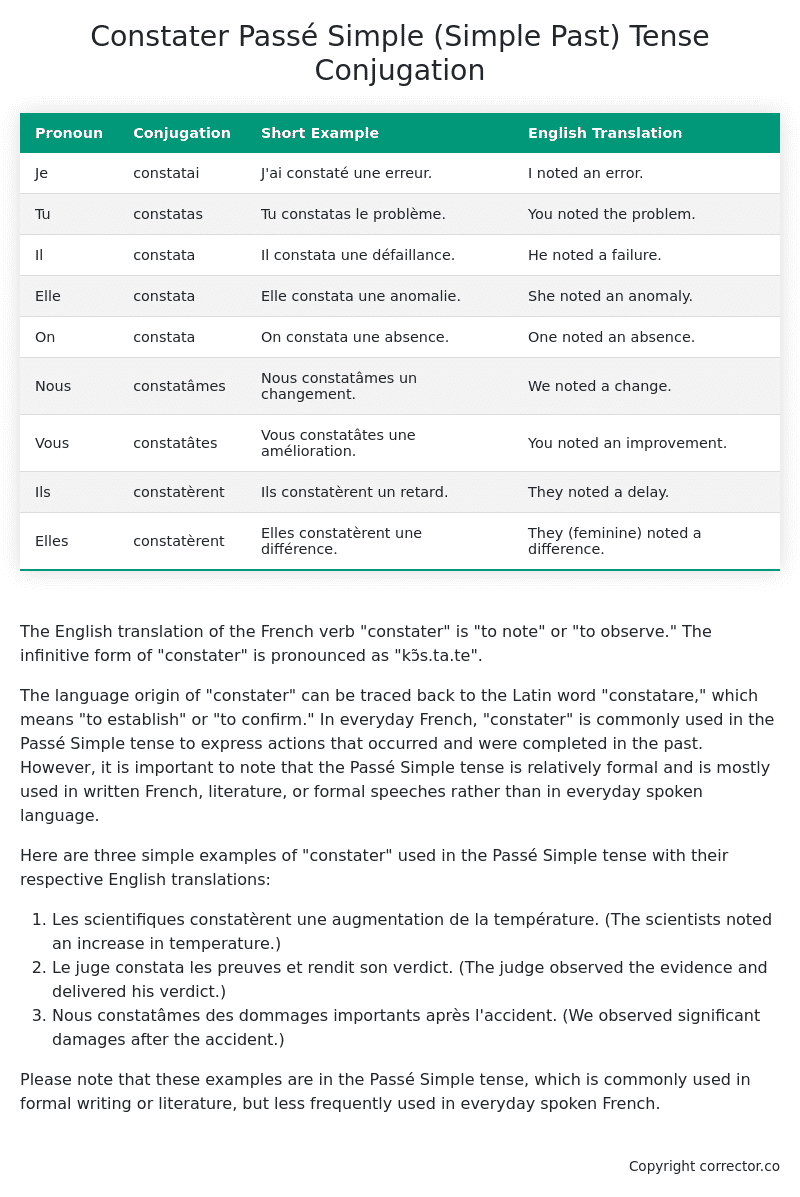Passé Simple (Simple Past) Tense Conjugation of the French Verb constater
Introduction to the verb constater
The English translation of the French verb “constater” is “to note” or “to observe.” The infinitive form of “constater” is pronounced as “kɔ̃s.ta.te”.
The language origin of “constater” can be traced back to the Latin word “constatare,” which means “to establish” or “to confirm.” In everyday French, “constater” is commonly used in the Passé Simple tense to express actions that occurred and were completed in the past. However, it is important to note that the Passé Simple tense is relatively formal and is mostly used in written French, literature, or formal speeches rather than in everyday spoken language.
Here are three simple examples of “constater” used in the Passé Simple tense with their respective English translations:
- Les scientifiques constatèrent une augmentation de la température. (The scientists noted an increase in temperature.)
- Le juge constata les preuves et rendit son verdict. (The judge observed the evidence and delivered his verdict.)
- Nous constatâmes des dommages importants après l’accident. (We observed significant damages after the accident.)
Please note that these examples are in the Passé Simple tense, which is commonly used in formal writing or literature, but less frequently used in everyday spoken French.
Table of the Passé Simple (Simple Past) Tense Conjugation of constater
| Pronoun | Conjugation | Short Example | English Translation |
|---|---|---|---|
| Je | constatai | J’ai constaté une erreur. | I noted an error. |
| Tu | constatas | Tu constatas le problème. | You noted the problem. |
| Il | constata | Il constata une défaillance. | He noted a failure. |
| Elle | constata | Elle constata une anomalie. | She noted an anomaly. |
| On | constata | On constata une absence. | One noted an absence. |
| Nous | constatâmes | Nous constatâmes un changement. | We noted a change. |
| Vous | constatâtes | Vous constatâtes une amélioration. | You noted an improvement. |
| Ils | constatèrent | Ils constatèrent un retard. | They noted a delay. |
| Elles | constatèrent | Elles constatèrent une différence. | They (feminine) noted a difference. |
Other Conjugations for Constater.
Le Present (Present Tense) Conjugation of the French Verb constater
Imparfait (Imperfect) Tense Conjugation of the French Verb constater
Passé Simple (Simple Past) Tense Conjugation of the French Verb constater (You’re reading it right now!)
Passé Composé (Present Perfect) Tense Conjugation of the French Verb constater
Futur Simple (Simple Future) Tense Conjugation of the French Verb constater
Futur Proche (Near Future) Tense Conjugation of the French Verb constater
Plus-que-parfait (Pluperfect) Tense Conjugation of the French Verb constater
Passé Antérieur (Past Anterior) Tense Conjugation of the French Verb constater
Futur Antérieur (Future Anterior) Tense Conjugation of the French Verb constater
Subjonctif Présent (Subjunctive Present) Tense Conjugation of the French Verb constater
Subjonctif Passé (Subjunctive Past) Tense Conjugation of the French Verb constater
Subjonctif Imparfait (Subjunctive Imperfect) Tense Conjugation of the French Verb constater
Subjonctif Plus-que-parfait (Subjunctive Pluperfect) Tense Conjugation of the French Verb constater
Conditionnel Présent (Conditional Present) Tense Conjugation of the French Verb constater
Conditionnel Passé (Conditional Past) Tense Conjugation of the French Verb constater
Conditionnel Passé II (Conditional Past II) Tense Conjugation of the French Verb constater
L’impératif Présent (Imperative Present) Tense Conjugation of the French Verb constater
L’impératif Passé (Imperative Past) Tense Conjugation of the French Verb constater
L’infinitif Présent (Infinitive Present) Tense Conjugation of the French Verb constater
L’infinitif Passé (Infinitive Past) Tense Conjugation of the French Verb constater
Le Participe Présent (Present Participle) Tense Conjugation of the French Verb constater
Le Participe Passé (Past Participle) Tense Conjugation of the French Verb constater
Struggling with French verbs or the language in general? Why not use our free French Grammar Checker – no registration required!
Get a FREE Download Study Sheet of this Conjugation 🔥
Simply right click the image below, click “save image” and get your free reference for the constater Passé Simple tense conjugation!

Constater – About the French Passé Simple (Simple Past) Tense
Formation
Usage
Narration
Historical Context
Interactions with other tenses
Passé Composé
Imparfait
Conditional and Subjunctive
Summary
I hope you enjoyed this article on the verb constater. Still in a learning mood? Check out another TOTALLY random French verb conjugation!


